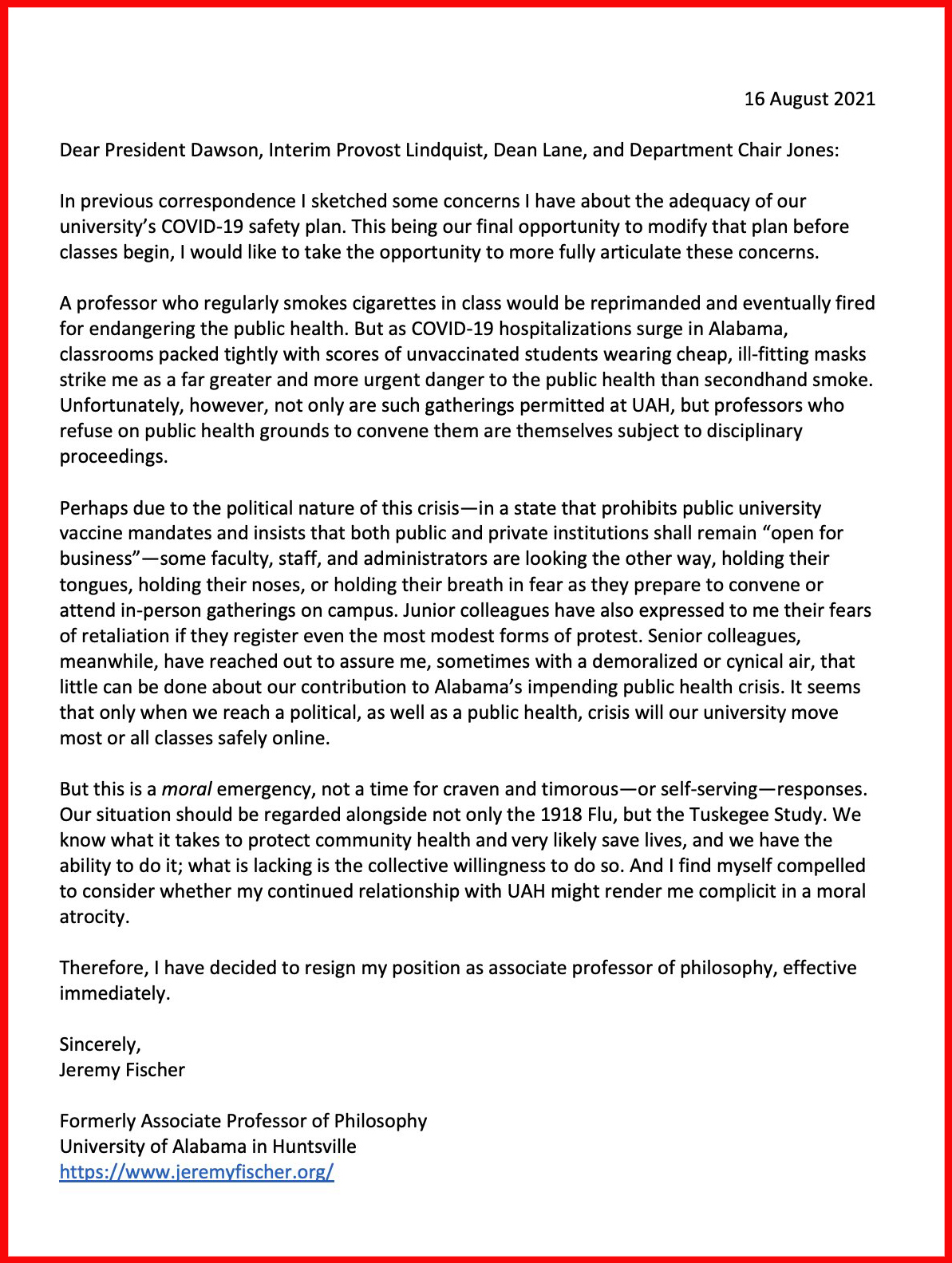Jeremy Fischer
You can view UAH’s current COVID policies here.
He also encouraged faculty—especially senior faculty—to form “local ad hoc COVID-policy committees” on their own campuses with their colleagues and to reach out to university unions, faculty senate committees, and school administrations with their concerns. He warned, “what is happening in the Deep South may well be coming soon to a town near you!”
Perhaps you might direct sympathetic readers to support the email campaign I have been urging. People can email the leadership of my former institution, UAH, and of the UA System more generally, and urge them to adopt the sensible COVID policy of our neighboring university, Alabama A&M: among other things, (1) moving courses online for the first two weeks of the semester and (2) mandating weekly random-sample (“sentinel”) testing of the unvaccinated thereafter. We also urge the adoption of (3) universal social distancing mandates that accord with C.D.C. recommendations for institutions of higher educations where not everyone is fully vaccinated.

Dr. Fischer had described UAH’s pandemic plans last month in a guest post here, “Sounding the Alarm: 2021-2022 COVID Risks at Unprotected Colleges and Universities” and launched a petition to urge the University of Alabama system to strengthen its COVID-19 safety protocols. In that earlier post, he wrote about the implications for his university of Alabama SB 267, signed into law on May 24th of this year, which prohibits state-funded schools from requiring students to be COVID-vaccinated.
I remain concerned about my former institution’s (1) lack of vaccine mandate (and its unreported, but likely low, student vaccination rate), (2) lack of re-entry COVID testing at the start of the semester, and (3) lack of regular COVID-testing of the unvaccinated throughout the semester; as well as (4) its refusal to implement social distancing indoors in accordance with C.D.C. recommendations for universities where not everyone is fully vaccinated, and also (5) its refusal to move substantial numbers of classes, especially large lecture classes, online, even when the instructor would prefer such a move.

Here are a few key decision-makers (and their public email addresses):
Yesterday, he did just that. He announced his resignation on Twitter. His resignation letter is reposted below in its entirety:
Writing to his university president, provost, college dean, and department chair, he said:

While UAH reformed some of the policies discussed in that earlier post and has now implemented an indoor mask mandate,* Dr. Fischer wrote, in an email:
In response to follow-up questions, he emailed:
Jeremy Fischer, who until yesterday was a tenured associate professor of philosophy at the University of Alabama in Huntsville (UAH), resigned from his position to protest his university’s COVID-19 policies for the coming term.
Darren Dawson, President, [email protected]
Robert (Bob) Lindquist, Interim Provost and Executive Vice President for Academic Affairs, [email protected]
Kristi Motter, Vice President for Student Affairs, [email protected]
Finis St. John IV, Chancellor, [email protected]
Members of the Board of Trustees, [email protected]
* The original version of this post did not mention this update to UAH’s policies.
Therefore, I have decided to resign my position as associate professor of philosophy, effective immediately.
Dr. Fischer, who specializes in moral psychology, ethics, and the emotions, voiced concerns about faculty complicity in a public health crisis, asked about whether instructors at unprotected institutions are morally permitted “to risk the public health in order to convene philosophy classes,” and suggested that faculty might consider resigning in protest.
We know what it takes to protect community health and very likely save lives, and we have the ability to do it; what is lacking is the collective willingness to do so. And I find myself compelled to consider whether my continued relationship with UAH might render me complicit in a moral atrocity.





